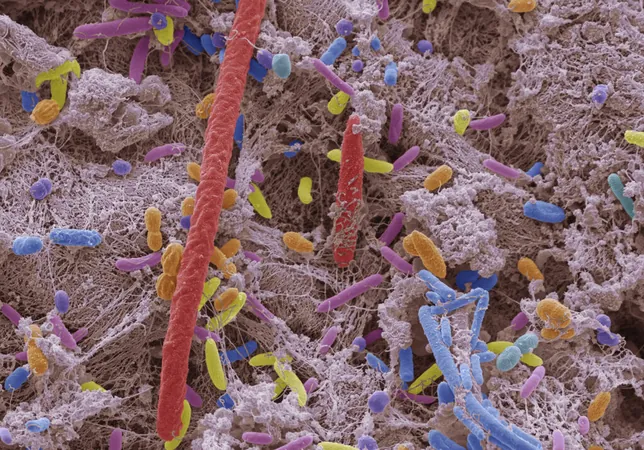
Surprising Link Between Microbiome and Mental Health in Pregnant Women Revealed!
2024-11-21
Author: Mei
Groundbreaking Study Overview
A groundbreaking study conducted by researchers from Michigan State University has unveiled a fascinating connection between the oral microbiome of pregnant women and their mental health, specifically in relation to stress, anxiety, depression, and post-traumatic stress disorder (PTSD). This research could pave the way for new treatments focused on oral health as a means to boost mental well-being during pregnancy.
Research Publication
The study, published in BMJ Mental Health, highlights a previously unexplored area: while the relationship between gut microbiomes and mental health has been examined, the oral microbiome had not been investigated in depth. Leading this research was Ann M. Alex, PhD, who emphasizes the importance of understanding how different microbes in the mouth and throat relate to maternal mental health conditions.
Study Analysis
Researchers analyzed data from 224 pregnant women participating in the Michigan Prenatal Stress Study, focusing on their mental health status during the second trimester. Participants provided saliva samples that were then meticulously examined, revealing that variations in their oral microbiomes were strongly associated with reported experiences of life stress and mental health symptoms.
Key Findings
The findings were particularly striking: women experiencing higher levels of anxiety and depression exhibited increased alpha diversity—meaning their microbiomes had a more varied composition. On the other hand, women who reported serious PTSD symptoms showed greater beta diversity, indicating a distinct microbiome profile entirely different from those with lower symptom levels.
Bacterial Correlations
Additionally, the study identified specific correlations between certain bacteria and mental health traits. For instance, women who faced recent life stress tended to have a higher abundance of Proteobacteria, while those with significant depression symptoms had an uptick of Spirochaetes. Furthermore, anxiety and depression were linked to greater quantities of Dialister species and Firmicutes, whereas the Eikenella genus was more prevalent among women showing high levels of anxiety, depression, or PTSD symptoms.
Impact of Lifestyle Factors
Remarkably, the study also explored the impact of various factors on oral microbiomes. Analysis of 22 potential covariates indicated that lifestyle choices, such as cigarette smoking, could account for 7.2% of variations observed in the microbiome, highlighting the intricate interplay between behavior and mental health. Other influencing factors included dental health issues, intimate partner violence, and the shock of an unplanned pregnancy.
Future Research Directions
Considering these findings, the research team advocates for further investigation into the oral microbiome as a promising avenue for interventions aimed at enhancing psychological health in pregnant women. By targeting oral health through dietary modifications and possibly incorporating probiotic treatments, there might be new hope for mothers grappling with the emotional challenges of pregnancy.
Conclusion
This new research sheds light on the hidden connections between our body's microbiome and mental health, revealing that taking care of our oral bacteria could be crucial during such a critical time as pregnancy. Expecting mothers, take note: enhancing your microbiome health could lead to significant improvements in your mental well-being!
 Brasil (PT)
Brasil (PT)
 Canada (EN)
Canada (EN)
 Chile (ES)
Chile (ES)
 España (ES)
España (ES)
 France (FR)
France (FR)
 Hong Kong (EN)
Hong Kong (EN)
 Italia (IT)
Italia (IT)
 日本 (JA)
日本 (JA)
 Magyarország (HU)
Magyarország (HU)
 Norge (NO)
Norge (NO)
 Polska (PL)
Polska (PL)
 Schweiz (DE)
Schweiz (DE)
 Singapore (EN)
Singapore (EN)
 Sverige (SV)
Sverige (SV)
 Suomi (FI)
Suomi (FI)
 Türkiye (TR)
Türkiye (TR)